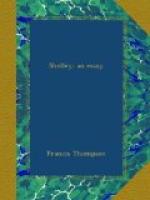After all, to finish where we began, perhaps the poems on which the lover of Shelley leans most lovingly, which he has oftenest in his mind, which best represent Shelley to him and which he instinctively reverts to when Shelley’s name is mentioned are some of the shorter poems and detached lyrics. Here Shelley forgets for a while all that ever makes his verse turbid; forgets that he is anything but a poet, forgets sometimes that he is anything but a child; lies back in his skiff, and looks at the clouds. He plays truant from earth, slips through the wicket of fancy into heaven’s meadow, and goes gathering stars. Here we have that absolute virgin-gold of song which is the scarcest among human products, and for which we can go to but three poets—Coleridge, Shelley, Chopin, {8} and perhaps we should add Keats. Christabel and Kubla-Khan; The Skylark, The Cloud, and The Sensitive Plant (in its first two parts). The Eve of Saint Agnes and The Nightingale; certain of the Nocturnes;—these things make very quintessentialised loveliness. It is attar of poetry.
Remark, as a thing worth remarking, that, although Shelley’s diction is at other times singularly rich, it ceases in these poems to be rich, or to obtrude itself at all; it is imperceptible; his Muse has become a veritable Echo, whose body has dissolved from about her voice. Indeed, when his diction is richest, nevertheless the poetry so dominates the expression that we feel the latter only as an atmosphere until we are satiated with the former; then we discover with surprise to how imperial a vesture we had been blinded by gazing on the face of his song. A lesson, this, deserving to be conned by a generation so opposite in tendency as our own: a lesson that in poetry, as in the Kingdom of God, we should not take thought too greatly wherewith we shall be clothed, but seek first {9} the spirit, and all these things will be added unto us.
On the marvellous music of Shelley’s verse we need not dwell, except to note that he avoids that metronomic beat of rhythm which Edgar Poe introduced into modern lyric measures, as Pope introduced it into the rhyming heroics of his day. Our varied metres are becoming as painfully over-polished as Pope’s one metre. Shelley could at need sacrifice smoothness to fitness. He could write an anapaest that would send Mr. Swinburne into strong shudders (e.g., “stream did glide”) when he instinctively felt that by so forgoing the more obvious music of melody he would better secure the higher music of harmony. If we have to add that in other ways he was far from escaping the defects of his merits, and would sometimes have to acknowledge that his Nilotic flood too often overflowed its banks, what is this but saying that he died young?
* * * * *




